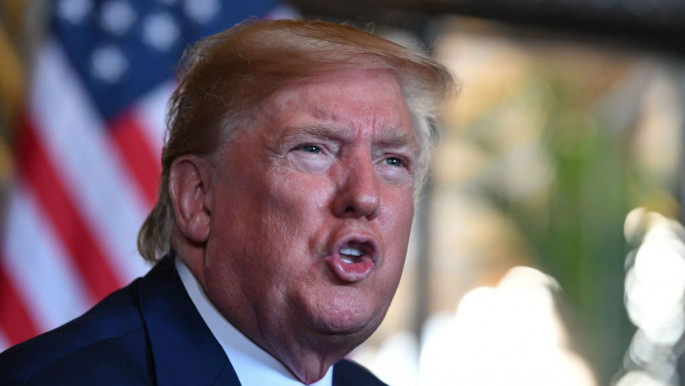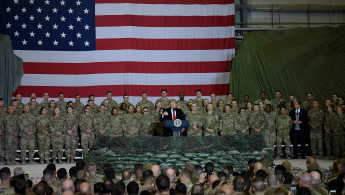Will the US-Taliban negotiations settle Afghanistan's political problem?
At least 26 Afghan security forces were killed in Taliban attacks on January 1. Last month, Taliban ruled out the possibility of taking part in intra-Afghan negotiations and stopping hostilities until the the United States signs a deal on complete troops withdrawal from Afghanistan with the insurgent group.
The US and the Taliban resumed peace talks on December 7, three months after US President Donald Trump abruptly called off the year-long peace process aimed at finding a political settlement with the insurgent group and ending the 18-year old war in Afghanistan.
The year-long US-Taliban negotiations have revolved around assurances the Taliban would not allow Afghan soil to be used for terrorist attacks against the US and in return, American troops would agree to a withdrawal from war-battered country, the main demand of the Taliban.
What change has the US-led war brought in Afghanistan after a series of awe and shock operations, heavy collateral damage and a cost of nearly $1 trillion in the past 18 years?
In one of its longest engagement in the war-torn country, the US lost over 2,400 of its soldiers and nearly 35,000 innocent Afghan civilians were killed in the conflict since 2001.
Taliban was a dominant force in 2001 in Afghanistan and still more than 50 percent of the country's territory is ruled over by the group after 18 years.
Afghanistan is as insecure today as it was 18 years ago when the US invaded the country.
 |
The year-long US-Taliban negotiations have revolved around assurances the Taliban would not allow Afghan soil to be used for terrorist attacks against the US and in return |  |
Cancellation and resumption of peace talks?
The US-Taliban negotiations that went on for one year however ended in smoke in September when Trump abruptly cancelled the peace talks at a time when both sides were all set to sign the peace deal to end the longest conflict.
 |
|
| Read also: Trump is on a reckless drive to war, and Congress is powerless to stop him |
Trump shut the diplomacy door after the insurgent group accepted responsibility for attack that killed 12 people including one American soldier in September.
Ironically, the same door was left open during one year of diplomacy, despite Taliban continued to launch attacks on the Afghan and US soldiers.
There was much talk of resuming stalled peace talks immediately after the first round of Afghan presidential elections on September 28.
Afghan elections officials announced the result on December 22. While Afghan President Ashraf Ghani scored the majority in presidential polls, his top rival Abdullah Abdullah rejected the result of what he called a 'fraudulent' vote.
The cancellation or resumption of the US peace talks is linked to the Afghan elections. The Afghanistan vote was actually a litmus test to expose the capacities of major stakeholders in the war-torn country – Taliban and the Afghan government backed by the US and NATO forces.
Around 20 to 25 percent of voter turnout – the lowest level since the 2001 – and accusations of fraud and misconduct put a question mark not only against the credibility of the elections but also on the Afghan government.
Ghani – labelled as an American puppet by the Taliban and pushed to the sidelines in the US-Taliban peace talks – could prove the credibility of his elected government through a transparent election with a voter's turnout of a more than 50 percent. But he has so far failed to do so.
Even in the 2004 elections, the voter's turnout was approximately 60 percent. What is noteworthy here was Ghani's pre-poll appeal calling on the Afghan people to give a mandate on the incoming leadership to negotiate peace with the Taliban.
The polling process and voters' low turnout amply shows the lack of confidence in Afghan's political leadership.
What has so far been palpable is Trump's ambition to win by taking sudden shifts on Afghanistan's war game. When he talked of war as an option, he talked of a US military onslaught on Taliban insurgents at its fiercest in a decade.
And when he talked of peace, he made a secret plan to fly Taliban leaders in for direct talks at the Camp David presidential retreat in September. The whiplash effect of his sudden shifts on Afghanistan only caused turmoil.
Now, frustrated with the America's longest and costly war in Afghanistan, Donald Trump seems in a hurry to bring the estimated 13,000 American soldiers home, a commitment he made during his election campaign in 2016. He is poised to take the political mileage of pullout of US troops in the presidential campaign this year.
 |
Now, frustrated with the America's longest and costly war in Afghanistan, Donald Trump seems in a hurry to bring the estimated 13,000 American soldiers home |  |
Political settlement, an uphill task
Now it is yet to be seen how Trump – who seems in a hurry to end the war – concludes the endgame in Afghanistan through peace talks with Afghan stakeholders.
Will Trump repeat the mistake of abandoning Afghanistan like his predecessors have? Afghanistan slid into a bloody civil war after the withdrawal of Soviet troops in the early 1989. The war-ravaged country witnessed more bloodshed and more devastation as a result of proxy war between the US and Russia in Afghanistan during the period between 1989 to 1992.
The US continued to support the Mujahideen or the predecessors of today's Taliban against the Najibullah regime in Kabul, while Soviets continued to back the Najibullah government until 1992.
At that time, the US was the least concerned about the theocratic and obscurantist approach of the Afghan mujahedeen to Islam and their tendencies toward fundamentalist religious policies. It was the US that abandoned Afghanistan after the Najibullah government was overthrown by the insurgents.
There will however remain several questions unanswered if the US concludes a peace deal with the Taliban paving the way for the withdrawal of US troops from Afghanistan. The US would leave behind the 300,000 Afghan National Security Forces [ANSF] trained by the US and NATO.
So what would be the status and future of ANSF in the presence of the Taliban militia? What would be the future law governing the country, would it be a Taliban's theocratic law or the law enforced by the elected Afghan government? In case of conflict with the Afghan government, the Taliban would remain a 'state within a state' in the war-wracked country.
Departure of the US troops without a political settlement could be a disaster for the war-battered country and the Afghan people are concerned about the future of their country. Many believe that withdrawal of foreign troops will embolden the extremist groups and they will take it as their victory while the Afghans will be left at the mercy of extremist groups.
Syed Fazl-e-Haider is a contributing analyst at South Asia desk of Wikistrat. He is a freelance columnist and the author of several books including the Economic Development of Balochistan (2004). He has contributed articles and analysis to a range of publications including Dawn, The Express Tribune, Asia Times, The National (UAE), Foreign Affairs, Daily Beast, New York Times, Gulf News, South China Morning Post, and The Independent.


![President Pezeshkian has denounced Israel's attacks on Lebanon [Getty]](/sites/default/files/styles/image_684x385/public/2173482924.jpeg?h=a5f2f23a&itok=q3evVtko)



 Follow the Middle East's top stories in English at The New Arab on Google News
Follow the Middle East's top stories in English at The New Arab on Google News


